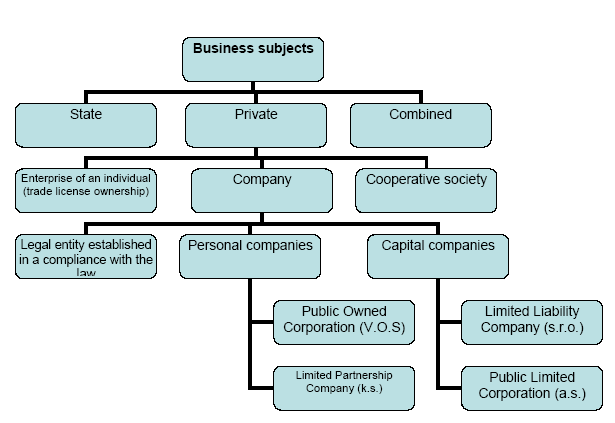2.1 Legislation regulating business environment
Basic legal rules regulating the business enterprise are :
The Commercial Code (law no. 513/1991 of the CC) is the basic legal rule for the
business enterprise. It regulates three relatively independent fields of economic
relations :
- the status of the enterpriser (the features of the enterpriser, the business
companies)
- the commercial-contractual relations (the purchase and the sale)
- other relations related to the business enterprise (e.g. the economic competition,
the accounting)
The Trades Licensing Act (law no. 455/1991 of the CC) regulates
- the conditions of the business enterprise based on the trade license ownership
- the control of their maintenance
The Commercial Code (§2) recognizes four categories of enterprisers.
enterprisers registered in the Register of Companies – business companies and
cooperative societies, state-owned enterprises
enterprisers running business based on the trade license ownership – they do not have
to be registered in the Register of Companies
enterprisers running business based not on the Trades Licensing Act but on special
regulations – private doctors, vets, advocates, notaries, auditors
physical entities who are producing agricultural products and are registered according
to special regulations (they are registered in the evidence of a municipal office )
The business enterprise is in the Commercial Code defined as follows :
systematic activity – it requires continuous or regularly repeated running of the
business, occasional gainful activities do not belong to the business enterprise (the
sale of redundant agricultural products),
carried out by the enterpriser independently
carried out on own responsibility – the enterpriser is bearing the risk for his/her business
results, he/she is responsible for assumed liabilities, even for potential business losses
or even for bankruptcy
for the purpose of gaining profit – this is the main aim of the business enterprise,
whereby profit is considered a motive, while the law does not require profit to be really
acquired, it suffices if the enterpriser carries out his/her activity with the intention of
acquiring profit.
According to the Commercial Code, the “enterprise” is defined as a certain unit of business
activities that are composed of following elements :
tangible – buildings, storages, production facilities, material, products, office facilities,
intangible – business secret, trademarks, know-how, position on the market,
personal – qualification structure of employees, their trade skills, experiences.
The enterprise as a unit has a certain value, which is created by the valuation of all above
stated elements. An enterprise does not have to be a factory with great tangible property and
numerous employees, but also an enterprise, in which there is just the enterpriser running
business with minimal tangible property and with minimal other elements of the business
enterprise. Enterprisers can be physical or legal entities.

| |
 |
|
